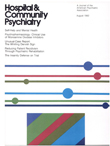Psychiatric Rehabilitation as a Deterrent to Recidivism
Abstract
An experiment was conducted to evaluate the effectiveness of a comprehensive rehabilitation program in deterring the rehospitalization of severely disturbed psychiatric outpatients. A total of 102 clients were randomly assigned at intake to either a full-time, comprehensive rehabilitation program or a part-time supportive treatment program at a separate location. After nine months, only 14 per cent of the subjects in comprehensive treatment had been rehospitalized, compared with 44 per cent of the subjects in supportive treatment. Regardless of treatment method, subjects who had histories of more frequent hospitalization and subjects who encountered higher levels of life-event stress during the follow-up period were more likely to relapse. The authors conclude that the great reduction in hospital days for subjects in the comprehensive treatment more than compensated for the program's higher cost.
Access content
To read the fulltext, please use one of the options below to sign in or purchase access.- Personal login
- Institutional Login
- Sign in via OpenAthens
- Register for access
-
Please login/register if you wish to pair your device and check access availability.
Not a subscriber?
PsychiatryOnline subscription options offer access to the DSM-5 library, books, journals, CME, and patient resources. This all-in-one virtual library provides psychiatrists and mental health professionals with key resources for diagnosis, treatment, research, and professional development.
Need more help? PsychiatryOnline Customer Service may be reached by emailing [email protected] or by calling 800-368-5777 (in the U.S.) or 703-907-7322 (outside the U.S.).



